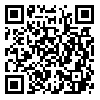BibTeX | RIS | EndNote | Medlars | ProCite | Reference Manager | RefWorks
Send citation to:
URL: http://jgn.medilam.ac.ir/article-1-196-en.html
Introduction and purpose: Population of the world is rapidly aging. Training is the most effective approach which has recently received major attention. Despite the vast theoretical improvement in planning and evaluation of educational programs, patient education still is not practically being implemented. Thereby, this study aimed to focus on determining lived experiences of elderly from effectiveness of education provided by their Rehabilitation centre.
Materials and Methods: This phenomenological study aims to explore lived experiences of 8 elderly women who received education in Grand Rehabilitation Center of Tonekabon. A semi-structured interview was used to collect data. After taking written consent form, patients’ interviews was recorded. Data analysis was done using the Colaizzi's method.
Findings: Following analysis of the transcribed interviews, emerging themes were categorized in major concepts and related sub-concepts. Finally "Effective relationship " and "Training competency" defined as the two essential elements which explain the elderly opinion on effectiveness of educational program.
Conclusion: The results of this study indicated that elderly perceive their educational programs to be effective once, there is an effective relationship and the program’s competency is high. Considering a program as an effective education may increases clients’ satisfaction, improves their quality of life, decreases their anxiety, increases living hope, reduces complications, increases the participation in health care programs and promotes independency in daily activities.
Received: 2016/09/21 | Accepted: 2016/11/5 | Published: 2016/12/10
| Rights and permissions | |
 | This work is licensed under a Creative Commons Attribution-NonCommercial 4.0 International License. |






